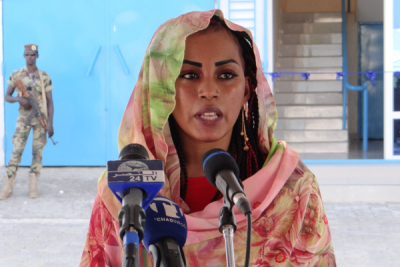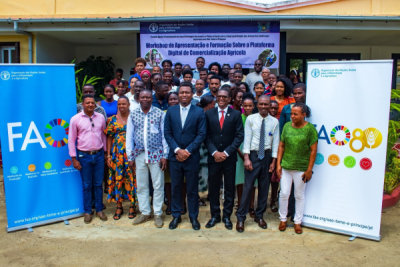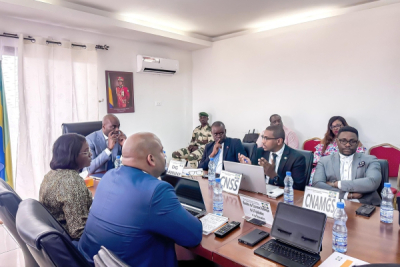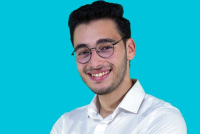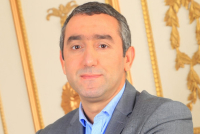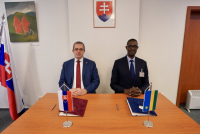- CEO and cofounder of Dojah, a 2021-founded KYC and ID verification firm
- Platform offers API and no-code tools for fraud detection and compliance
- Company supports secure user onboarding and real-time risk monitoring
Oluwatobiloba Ololade (pictured), a Nigerian tech entrepreneur, is the cofounder and CEO of Dojah, a company specializing in identity verification and Know Your Customer (KYC) compliance Founded in 2021, Dojah describes itself as an anti-fraud infrastructure for the Internet. It enables businesses to verify customer identities, detect fraud, and meet regulatory requirements through APIs and no-code tools, ensuring secure and seamless user onboarding.
The company’s services are structured around two main areas. The first, Identity Hub, focuses on verifying individuals and businesses through document validation, biometric checks, and address confirmation. The second area covers fraud prevention and transaction monitoring, featuring real-time fraud detection, anti–money laundering tracking, risk assessment, and credit scoring tools. A centralized dashboard allows case management, alert configuration, access control, and detailed analytics.
Ololade graduated in 2013 with a bachelor’s degree in computer engineering from Obafemi Awolowo University. He began his career in 2012 as a lead developer at Elta Solutions. In 2015, he joined Kedesa, a Nigerian all-in-one messaging software company, as director.
From 2017 to 2021, he served as technology lead at TradeBuza, which uses tech to help firms manage contract farming and commodity trading programs. During the same period, between 2019 and 2021, he also worked as head of engineering at Moneymie, a U.S.-based fintech company.
-
The University of Dar es Salaam (UDSM) has digitized over 1,000 online courses accessible to 39,000 students across multiple campuses.
-
The initiative is part of the Higher Education for Economic Transformation (HEET) program, which is over 80% implemented.
-
UDSM’s digital infrastructure now includes a 10 Gbps high-speed network to support hybrid and remote learning.
Tanzania is accelerating the integration of information and communication technologies (ICT) to drive socio-economic development, with education at the forefront of this shift.
Speaking at a meeting with the Tanzania Editors Forum in Dar es Salaam on October 21, William A. L. Anangisye, Vice-Chancellor of the University of Dar es Salaam (UDSM), said the Higher Education for Economic Transformation (HEET) program represents a new stage in higher education reform.
Already more than 80% implemented, HEET aims to make digitalization a strategic tool for academic competitiveness and innovation.
The project reached a milestone with the launch of more than 1,000 digital courses, now available to 39,000 students across UDSM campuses in Dar es Salaam, Lindi, Kagera, and Zanzibar.
This digital offering relies on a 10 Gbps broadband infrastructure designed to support hybrid learning platforms and strengthen remote teaching capabilities.
Liberato Haule, Deputy Coordinator of the program, said the infrastructure “modernizes learning environments and enhances partnerships between universities and businesses.”
HEET, funded by both public and private partners, aims to foster collaboration between universities and the private sector in designing curricula focused on digital skills, engineering, and innovation.
Deodatus Balile, President of the Tanzania Editors Forum, praised the program as “a national benchmark in educational transformation.”
This initiative comes as the World Bank reports that only 9% of young Africans have access to higher education. By equipping its universities with cutting-edge digital tools, Tanzania seeks to position itself as a regional hub for training and innovation, aligning education more closely with employment and industrial growth.
This article was initially published in French by Félicien Houindo Lokossou
Adapted in English by Ange Jason Quenum
-
Net is a new Ivorian job platform helping young people access employment.
-
The startup uses AI-based matching to link candidates with suitable opportunities.
-
Founder Sébastien Kouassi is a two-time national award winner for digital innovation.
Ivorian software engineer and entrepreneur Sébastien N’Goran Kouassi is the founder of EmploiRapide.Net, a digital startup dedicated to improving youth employability in West Africa.
Launched in April 2025, EmploiRapide.Net offers an online job platform designed to make access to the labor market easier. It aggregates and centralizes thousands of job offers from both local and international companies.
The platform features an intelligent search engine that matches users with opportunities aligned with their skills, experience, and location. Candidates can upload their CVs and apply directly to suitable positions. Less than a month after launch, the site had already recorded more than 30,000 job searches.
In 2018, Kouassi created Mwaou, a web and mobile app for reconnecting with former classmates, followed in 2021 by mjChrist, a site for sharing Christian testimonies. He holds a master’s degree in computer systems and software engineering from the African School of Information and Communication Technologies (ESATIC) in Côte d’Ivoire, earned in 2021.
Alongside his entrepreneurial ventures, Kouassi has worked with several companies and institutions. In 2021, after an internship as a web developer at Inetum Côte d’Ivoire, he became a vTiger CRM consultant for the National Investment Bank (BNI) and SNEDAI.
In 2023, he worked as a freelance web developer for HST Protection, then as a software engineer at Y3 Audit & Conseils and Bridge Bank Group Côte d’Ivoire. Between 2024 and 2025, he served as a developer and automation tester at the Côte d’Ivoire Single Window for Foreign Trade (GUCE-CI).
His commitment to technological innovation has earned him recognition twice, as he received the second National Excellence Award for Best Young Digital Innovation Project in both 2023 and 2024.
-
Telecom engineer Zara Ahmed Sedick becomes the first woman to head Chad’s AI Directorate.
-
The new body was created as part of the digital ministry’s recent restructuring.
-
Her career includes roles at Ericsson, Huawei, and the Chadian presidency.
On October 24, the Chadian Ministry of Posts and Digital Economy officially appointed telecommunications engineer Zara Ahmed Sedick as head of the newly created Directorate General of Artificial Intelligence (DGIA).
The establishment of the DGIA is part of the ministry’s recent restructuring led by Minister Boukar Michel. According to a statement from the ministry, it “also reflects the political commitment of the President of the Republic, Head of State, Marshal Mahamat Idriss Deby Itno, as outlined in his five-year program.”
Zara Ahmed Sedick, the first woman to lead the DGIA, holds a degree in telecommunications engineering from the École Supérieure Privée d’Ingénierie et des Technologies (ESPRIT) in Tunisia and a specialized certificate in mobile radio network engineering from Paris Telecom.
She joined the Ministry of Posts and Digital Economy in 2024 as director of technology monitoring. Her professional career began in 2011 at Ericsson in Chad as a network optimization engineer. In 2015, she joined Huawei in the same country as a Node Package Manager (NPM) engineer.
In 2019, she was appointed technical adviser on Posts and Information and Communication Technologies at the Presidency of the Republic of Chad. The following year, she became director of control and inspection at the Chadian Regulatory Authority for Electronic Communications and Posts, a position she held until 2024.
-
The new digital platform will connect farmers and buyers to improve market access.
-
Developed by the government and FAO, it aims to cut post-harvest losses and boost efficiency.
-
Agriculture accounts for 14% of GDP and 80% of exports but faces structural challenges.
The government of São Tomé and Príncipe, in partnership with the Food and Agriculture Organization (FAO), officially launched on October 24, a new digital platform designed to help farmers promote and sell their products.
Developed by the Directorate of Entrepreneurship at the government’s request, the platform seeks to streamline the movement of agricultural goods from field to market, reduce post-harvest losses, and bring producers and consumers closer together. Designed to be simple and accessible, it builds on existing digital habits among local farmers, many of whom already use smartphones and WhatsApp.
The initiative forms part of a broader program to promote youth employment in agriculture. The sector remains central to the national economy, contributing about 14% of GDP and nearly 80% of export earnings, according to the French Development Agency (AFD). However, it still faces structural challenges, including limited market access, lack of price and demand information, weak distribution networks, and high post-harvest losses.
The new platform is positioned as a strategic tool to turn the country’s agricultural potential into real economic value. It aims to strengthen the competitiveness of local value chains, improve market access, diversify trade opportunities, and create new prospects for young rural entrepreneurs. Over time, this digitalization of agriculture is expected to improve traceability, raise farmers’ incomes, and modernize the rural economy of the archipelago.
- Project aims to boost transparency and revenue collection
- Full national rollout planned for January 2026
Gabon is set to launch, on October 30, a pilot project to digitize its social security and tax collection systems, according to the Ministry of Digital Economy and Innovation. The move follows a recent meeting with key institutions responsible for social contributions and public revenue.
The initiative involves rolling out an integrated digital system to automate the collection of social security and tax payments, enable real-time transaction monitoring, and improve financial transparency. The pilot, which runs until December 15, will be followed by a full rollout in January 2026. The ministry said the technical platform is already operational and will serve as the foundation for modernizing fund management systems.
The project is part of broader efforts to streamline public administration and improve oversight of financial operations. Social funds — notably the National Health Insurance and Social Guarantee Fund (CNAMGS) and the National Social Security Fund (CNSS) — have long faced problems such as payment delays, slow manual processing, and limited traceability. Digitization is seen as a long-term solution to strengthen the collection and redistribution of social funds.
The reform supports the “Digital Gabon” strategy led by Transitional President Brice Clotaire Oligui Nguema, who has made digital technology a key driver of public sector reform. The Digital Economy Ministry has already launched complementary projects, including digitizing the civil service payroll system and linking financial management agencies through the SIGFiP platform, which is now being deployed.
In the long term, digitizing these systems is expected to enhance transparency in public fund management, boost revenue mobilization, and reduce the costs associated with manual processes. It will also give the government a comprehensive view of its institutions’ finances, helping to strengthen public and business confidence in state services.
Samira Njoya
He's developing digital platforms that allow Tunisian students and undergraduates to access courses and educational resources. His initiatives create a structured, interactive online learning environment tailored to school and university needs.
Rayen Bouajaja, a Tunisian entrepreneur specializing in digital education, is the founder and CEO of Lyceena Academy, an online learning platform for high school students.
Founded in 2015, Lyceena Academy offers affordable tutoring courses aligned with the national curriculum. Its teaching team, made up of Tunisian educators, delivers weekly interactive classes and video lessons covering all subjects, from literature to the sciences.
The platform uses proprietary technology that gives students access, via computer or smartphone, to video lessons, interactive quizzes, and live Q&A sessions with teachers. This system gives students a balance of flexibility and personalized support.
Bouajaja is also the co-founder and CEO of Faccna.tn, launched in 2020. The platform serves Tunisian university students, providing access to opportunities and offering academic and career guidance through resources, practical advice, and testimonials.
In 2016, he founded BIL Bizerte, a youth-led participatory event. Bouajaja holds a bachelor’s degree in law (2022) from the Faculty of Legal, Political and Social Sciences in Tunis. He also completed a computer programming course at GOMYCODE, an online school specializing in digital skills.
Melchior Koba
He's designing digital tools that are changing how Algerians organize their stays and trips. His approach aims to simplify every step, from choosing accommodation to making payments.
Algerian engineer and tech entrepreneur Amara Amaouz is the co-founder and CEO of Namlatic, a startup founded in 2019 to bring digital solutions to Algeria’s hospitality sector.
Namlatic operates an online platform for booking hotels across the country and also offers ferry bookings between Algeria and Spain. The company aims to modernize tourism and hospitality through an integrated online booking and payment system tailored to the Algerian market, with an interface in French, Arabic, and English.
To make the service more user-friendly, the platform accepts several payment methods, including national cards (CIB and Edahabia), international cards (Visa and Mastercard), bank transfers, and cash on arrival. Users can modify or cancel their reservations directly through the website.
Amaouz holds an engineering degree in Artificial Intelligence and Decision Systems from Saad Dahlab University in Blida (2005) and a master’s degree in the same field from Pierre and Marie Curie University in France (2007).
He began his career in 2005 as a developer at Telematis, an Algerian firm later acquired by the SATEC Group, a systems integration specialist. From 2007 to 2011, he worked as a business intelligence consultant at RT Consulting, a firm specializing in data-driven decision systems. He currently works as a freelance business intelligence consultant.
Melchior Koba
- Rwanda, Slovakia sign MoU to boost bilateral cybersecurity cooperation
- Pact includes joint training, threat response, and tool sharing
- Rwanda eyes cyber ecosystem growth; Slovakia expands global ties
The Rwanda National Cyber Security Authority (NCSA) signed a Memorandum of Understanding (MoU) with the Slovak National Security Authority (NBÚ) on Monday, Oct. 20, during a visit to Bratislava. The pact establishes a framework for bilateral collaboration on cybersecurity.
The agreement focuses on sharing best practices for threat detection and response, jointly strengthening training capacity, and exchanging tools and methodologies between the two national authorities. Rwanda showed particular interest in "CyberGame," a incident simulator developed by NBÚ to train teams in dealing with real-world cyberattacks. Slovakia views the partnership as an opportunity to expand its role as a reliable international partner in the cyber domain.
This collaboration comes as both nations seek to solidify their cybersecurity postures. In November 2024, Slovakia revised its national law to comply with the European NIS2 Directive, bolstering its resilience against cyber threats. The country's market for cyber solutions is also growing rapidly, estimated to be worth nearly $76 million in 2025, according to Statista.
Rwanda launched its National Cybersecurity Strategy in 2024, enhancing its mechanisms for protecting critical infrastructure and training experts. The country is also among the first in Africa to achieve the "Role Model" designation on the International Telecommunication Union’s (ITU) Global Cybersecurity Index, with a score between 95% and 100%, underscoring its continental leadership in the field.
By strengthening cooperation, Slovakia and Rwanda are paving the way for increased expertise exchange, joint training programs, and the standardization of their practices. This partnership could ultimately help Rwanda accelerate the development of its cyber ecosystem while offering Slovakia an expanded technological presence in Africa, aiming for a safer and more interconnected cyberspace.
Samira Njoya
- TAHA launches HortiMarket to digitize Tanzania’s horticulture trade
- Platform links producers, buyers via web, app, WhatsApp, and USSD
- Low rural internet access may hinder platform’s wide adoption
The Tanzania Horticultural Association (TAHA) has launched a new digital platform to connect producers, buyers, exporters, and service providers within the horticulture sector. The platform, named HortiMarket, is accessible via a website, a mobile application, a WhatsApp chatbot, and a USSD code, local media outlet Tanzania Invest reported on Monday, Oct. 20.
The new digital portal will serve as a centralized online marketplace where horticultural value chain actors can interact, exchange information, and complete transactions. HortiMarket is designed as a strategic response to persistent market access challenges that hinder the growth and competitiveness of Tanzania's horticulture sector.
According to TAHA, the digital service will enable stakeholders to access new opportunities, make informed decisions, and improve supply chain coordination, thereby boosting the overall efficiency and profitability of horticultural trade.
This pursuit of more efficient marketing channels is part of a broader strategy to grow the sector's export segment. In June, TAHA announced its goal to increase fruit and vegetable export revenues to $2 billion by 2030. This figure is nearly five times the annual average of $382 million generated by the sector between 2021 and 2024, according to data compiled by the country's central bank.
A key challenge for TAHA will be effectively integrating the over 500,000 smallholder producers active in the local horticulture industry through the new digital platform. The deployment of a digital service in the agricultural sector raises concerns about accessibility in rural areas, where the use of the internet and smartphones remains limited.
Data from the International Telecommunication Union (ITU) shows that 31.9% of the population in Tanzania has internet access, suggesting that nearly two-thirds of the population remain unconnected. This digital divide could limit the platform’s adoption, particularly as nearly 60% of Tanzanians live in rural areas where agriculture is essential to their livelihood, according to World Bank data.
Stéphanas Assocle
More...
Strategically located between Europe and Africa, Morocco has leveraged its geographical position and its well-educated youth to develop its services economy. The digital sector is now a major beneficiary of this approach, offering considerable opportunities for international businesses.
Exports of digital and outsourced services have emerged as a quiet engine of Morocco’s economy, reaching 26.2 billion dirhams ($2.8 billion) in 2024. According to Morocco’s foreign exchange office, Office des Changes, this is a slight 0.2% increase from 2023. The sector’s growth momentum was confirmed in the first half of 2025, with exports hitting 13.4 billion dirhams, a 3.5% rise compared with 12.9 billion dirhams during the same period in 2024.
The sector’s growth momentum was confirmed in the first half of 2025, with exports hitting 13.4 billion dirhams
Digital service exports involve specialized Moroccan teams providing services to foreign companies and clients. These local teams execute advanced digital tasks, or international companies outsource support and customer service activities to Moroccan providers to reduce operating costs. Digital services are the most dynamic and in-demand component, generating the majority of the sector's export revenue.
The sector is predominantly driven by Information Technology Outsourcing (ITO) and Customer Relationship Management (CRM). In 2024, IT and technology services, which encompass development, maintenance, and cybersecurity, accounted for 40.3% of the total. CRM and call center activities, which handle assistance and multilingual support, followed closely at 37.4%. Together, these two segments represent 78% of total digital service exports.
Other key segments contribute to the growth: Engineering Services Outsourcing (ESO), which includes design and systems integration, accounted for 13.2% of revenue. Business Process Outsourcing (BPO), covering back-office functions like accounting and data entry, made up 8.9%. Meanwhile, Knowledge Process Outsourcing (KPO), which focuses on high-value tasks such as financial analysis and business intelligence, was the smallest component at 0.2%.
Despite global tensions, including inflation and exchange rate volatility, Engineering Services Outsourcing (ESO) revenues grew, a sign of Morocco’s gradual move up the value chain. ESO receipts rose from 3.2 billion dirhams in 2023 to 3.4 billion in 2024, already reaching 2.5 billion dirhams in the first half of 2025.
Despite global tensions, including inflation and exchange rate volatility, Engineering Services Outsourcing (ESO) revenues grew, a sign of Morocco’s gradual move up the value chain
Business Process Outsourcing (BPO) also grew, rising from 1.9 billion dirhams to 2.3 billion dirhams between 2023 and 2024, with 1.3 billion dirhams generated in the first half of 2025. Conversely, Knowledge Process Outsourcing (KPO) experienced a sharp decline, falling from 78 million to 48 million dirhams, and totaled 21 million dirhams in the first half of 2025.
The sector’s stability in 2024 and positive signals in 2025 support Morocco's foreign exchange earnings and its export diversification beyond goods. The acceleration of engineering services demonstrates that Morocco is asserting itself as an engineering hub near Europe, offering reduced lead times and compliance with international standards, rather than solely a call center platform.
The growth in outsourced digital services translates into stable revenue and qualified jobs for the Moroccan economy. Call centers and support activities recruit young people with strong language and interpersonal skills. IT and technology services, however, stimulate demand for more technical and better-paid profiles. The Ministry of Digital Transition and Administrative Reform reported the sector already supported 141,000 jobs in 2023, up from 130,000 in 2022 and 100,000 in 2020.
The acceleration of engineering services demonstrates that Morocco is asserting itself as an engineering hub near Europe, offering reduced lead times and compliance with international standards, rather than solely a call center platform
To better manage this growth trajectory, the Office des Changes and the Ministry of Digital Transition have launched a project to modernize monitoring indicators for digital service exports. The goal is to obtain more granular data to target training, regional attractiveness, and promising niche markets. This work is part of the Digital Morocco 2030 strategy.
To maintain this growth, Morocco must tackle three key challenges: adapting to the era of automation by ensuring continuous upskilling to maintain competitiveness against artificial intelligence; guaranteeing high quality service, robust cybersecurity, and impeccable business continuity to compete internationally; and finally, developing talent and infrastructure across the country. Attracting higher value-added projects requires a broader pool of skilled talent and a regional network of infrastructure extending beyond major cities. Coordinated execution of these reforms across government actors will be key to success.
Muriel Edjo
- GSMA, African operators set $30–$40 4G smartphone standard
- Coalition urges tax cuts, bulk orders to lower device costs
- Affordable smartphones key to bridging Africa’s digital divide
The GSMA, the global telecom industry body, and six major African mobile operators, including Orange, are joining forces to expand smartphone access across the continent. On Tuesday, Oct. 21, at the Mobile World Congress in Kigali, Rwanda, the coalition announced a basic technical standard for affordable 4G smartphones. The standard defines key components such as memory, screen, battery, and camera, aiming to ensure a reliable and durable 4G experience at a target price between $30 and $40.
According to the GSMA, the physical components of a smartphone—the screen, processor, memory, radio, and battery—account for 50% to 70% of its total cost. The group says lasting price cuts require optimizing component costs, achieving economies of scale through mass production, and streamlining expenses such as patents, logistics, and distribution margins.
Standardization is central to this approach: by allowing all carriers to order the same model, component suppliers can lower prices for large orders. The GSMA hopes to consolidate demand around a single design, giving manufacturers confidence to produce at scale and cut costs.
In the coming months, the GSMA plans to work with Original Equipment Manufacturers (OEMs) and tech firms to define the core requirements and gain their support for affordable 4G devices.
To make this vision a reality, the coalition is focusing on two main strategies. In the coming months, the GSMA plans to work with Original Equipment Manufacturers (OEMs) and tech firms to define the core requirements and gain their support for affordable 4G devices. At the same time, it is urging African governments to cut taxes on smartphones priced below $100. South Africa, for example, removed excise duties on phones costing under 2,500 rand ($136) in March 2025 to make devices more affordable for low-income households.
The GSMA notes that in some countries, VAT and import duties can raise handset prices by more than 30%, pushing up costs for consumers and slowing digital inclusion. “Access to a smartphone is not a luxury – it is a lifeline to essential services, income opportunities and participation in the digital economy,” said GSMA Director General Vivek Badrinath. “By uniting around a shared vision for affordable 4G devices, Africa’s leading operators and the GSMA are sending a strong signal to manufacturers and policymakers. This is an important step toward bridging the digital divide and enabling millions more people to benefit from mobile connectivity.”
For Africa, the main obstacle to mobile service access is no longer network coverage but handset cost.
For Africa, the main obstacle to mobile service access is no longer network coverage but handset cost. Over the past decade, operators have invested heavily to extend coverage. As a result, by 2024, the continent’s mobile coverage reached 86% for 3G, 71% for 4G, and 11% for 5G, according to the International Telecommunication Union (ITU). Yet only 52% of Africans were connected to mobile broadband.
GSMA Intelligence estimates that a $40 smartphone could bring another 20 million people in Sub-Saharan Africa online, while a $30 device could connect up to 50 million more.
The GSMA defines affordability as a price equivalent to 15–20% of average monthly income. The World Bank estimates that in low- and middle-income countries, an entry-level smartphone costs about 18% of a typical adult’s monthly income—but this rises to 73% for the poorest 40% of households in Sub-Saharan Africa.
For telecom operators, making smartphones more affordable is strategically vital: it means a broader internet user base and higher data revenue.
Beyond technology and tax policy, genuine smartphone accessibility requires a mix of measures to ease entry and promote lasting use.
Beyond technology and tax policy, genuine smartphone accessibility requires a mix of measures to ease entry and promote lasting use. Financing is key: offering installment payments through operators or microcredit adapted to irregular incomes, with clear pricing and insurance, makes devices easier to obtain. After-sales service also matters: a local repair network, available spare parts, and capped prices extend device lifespans, reduce waste, and protect consumers’ budgets.
Building digital skills is equally important. Many still see smartphones as a luxury simply because they don’t know how to use them. Training users on basic features improves autonomy and increases the perceived value of the device relative to its cost.
Combined, these factors make a smartphone a genuine investment — a tool for work, education, and access to essential services. To sustain this progress, policymakers and industry must design end-to-end solutions — from purchase to maintenance — ensuring smartphones become a lasting driver of digital inclusion.
Muriel Edjo
- Digital Telecom, AS Datel partner on African land digitization
- E-cadaster to boost tax, transparency, and resource tracking
- Geospatial tech market in region set to hit $69.7B by 2030
Digital Telecom, an Abidjan-based subsidiary of Digital Afrique Telecom (DAT), announced a partnership on Wednesday, Oct. 22, with Estonia’s AS Datel, a geospatial technology firm. The agreement aims to deploy advanced satellite and digital cadastral solutions across Africa to modernize land management, detect illegal construction, and track illegal mining.
“By partnering with AS Datel, we are bringing world-class satellite and e-governance systems to Africa,” said Simplice Anoh, CEO of Digital Telecom. “This is more than just technology; it’s about empowering governments to protect their resources, ensure transparency, and increase revenue that can be reinvested in public services.”
The partnership focuses on deploying an advanced e-cadaster system — a centralized, fully digital platform that will integrate updatable cadastral maps, automated property tax modules, and tools to secure and manage data exchanges. The innovation will enable local and national authorities to maintain accurate property records, streamline tax collection, and improve transparency for citizens and investors.
Estonia’s AS Datel comes from a country renowned for its excellence in e-governance and secure digital systems. The company brings proven expertise in Geographic Information Systems (GIS) and Earth observation. For Digital Telecom and its parent company, the initiative aligns with African governments’ drive to modernize land systems, improve resource management, and strengthen fiscal transparency.
The project comes as the geospatial technology market rapidly expands in the region. According to Grand View Research, the sector in the Middle East and Africa is projected to reach $69.7 billion by 2030, driven by growing adoption of geolocation, remote sensing, and spatial analysis tools in agriculture, resource management, and urban planning.
Ultimately, the partnership is expected to transform how African authorities register assets, enforce property taxes, and combat illegal activities. By equipping states with reliable digital tools, it paves the way for more transparent governance, higher public revenues, and stronger protection of environmental resources.
Samira Njoya
- UNICEF and GSMA unveiled the Africa Taskforce on Child Online Protection at MWC25 Kigali.
- Africa has one of the world's fastest rates of children coming online. Young users face cyberbullying, exploitation, harmful content, and AI-driven threats.
- From Policy to Action: The Taskforce implements the GSMA's June 2025 whitepaper recommendations.
In a move to address the growing risks facing Africa's young internet users, UNICEF and the GSMA have launched the Africa Taskforce on Child Online Protection (COP), marking what it says is the continent's first coordinated, multi-stakeholder platform dedicated to digital safety for children.
The initiative, unveiled at Mobile World Congress (MWC) 2025 Kigali, brings together mobile operators, technology companies, regulators, law enforcement agencies, and civil society organizations to implement comprehensive child protection strategies across Africa's rapidly digitalizing landscape.
"As Africa's children step boldly into the digital world, their safety must come first," said Etleva Kadilli, UNICEF Regional Director for Eastern and Southern Africa. "The Africa Taskforce on Child Online Protection is a uniquely African platform to ensure technology shields children from harm while opening doors to learning, play, and growth."
The Taskforce comes as Africa experiences one of the world's fastest rates of digital adoption among young people. GSMA data shows 527 million mobile subscribers in Sub-Saharan Africa by end-2023, representing 44% of the population.
However, this digital revolution brings significant risks. Children across Africa increasingly face cyberbullying, online exploitation, exposure to harmful content, and misinformation – challenges amplified by the continent's mobile-first internet landscape and the rapid emergence of artificial intelligence technologies, says UNICEF.
The Taskforce builds directly on recommendations from the GSMA's June 2025 whitepaper, Enhancing Child Online Protection in Sub-Saharan Africa, developed with UNICEF and regional partners. That report called for coordinated action from governments, industry, civil society, and youth to create safer digital environments.
The Taskforce's founding members represent a cross-section of Africa's digital ecosystem, including major telecommunications operators MTN Group, Orange, Safaricom, Vodacom Group, and Axian Telecom, alongside international organizations such as INTERPOL, the International Centre for Missing and Exploited Children (ICMEC), Internet Watch Foundation, and Child Helpline International.
By centering African voices, particularly young people who represent the continent's demographic majority, the Taskforce aims to develop contextually appropriate interventions that balance protection with the transformative opportunities digital access provides for education, economic participation, and social connection.
The initiative positions Africa to potentially lead global conversations on child-centered digital governance, offering models that prioritize both safety and access in mobile-first, youth-majority populations – characteristics increasingly relevant worldwide.
As the Taskforce begins its work, its success will likely depend on sustained commitment from all stakeholders, adequate resourcing for implementation, and genuine integration of youth perspectives into decision-making processes.
Hikmatu Bilali





